(Originally posted on LiveJournal)
In San Diego during Comic Con last month, the shuttle buses serving the convention attendees (which circled the city between the convention center and various areas of hotels) were plastered with ads for the various series from the cable service Showtime. Now, Showtime has long been known for delivering “edgy” shows, including (often by mandate from the service) plenty of rather explicit sex scenes. Which makes them dubious properties as pieces of general entertainment (at least in my book). And it’s not that I have a flat-out objection to such entertainment. But it certainly does not readily appeal to me.
But for five days, I would see, coming and going, ads that declared “OUR HEROES HAVE MORE FUN.”
“Heroes?” I thought. Heroes??
(The shows being advertised were Dexter, Nurse Jackie, Californication and Weeds.)
It really made me mull over the use of the term “hero.” I’ve done that before, of course. I spent some time on the matter when I was writing The Scribbler’s Guide to the Land of Myth, because of the “Hero’s Journey” stuff. And yes, I did end up using the term “hero” to refer to a story’s main character, regardless of their personal qualities or gender. But even so, the default interpretation of the word “hero” is one of a positive nature: Heroes are people we look up to, admire, and/or want to be like.
How the heck can anyone call the main characters of the Showtime shows “heroes”?

Weeds is about a widowed mother who turns to selling marijuana in order to support herself and her kids. Are we supposed to admire this? The show is touted as a comedy-drama, no less. Drug running and dealing is comedy? Really? I suppose some would say, “She’s trying to take care of her kids! It’s the only thing that was open to her!” But come on. Do people really no longer have a moral compass? One that says at the very least that any monetary pursuit that could result in having her children taken away from her (should she be caught dealing drugs) is not a wise choice? Why is this entertainment in a serial format? I could see possibly a one-shot dramatic story, but a comedic series? In order to sustain it, the audience has to be complicit with the character’s choice to engage in illegal activity.
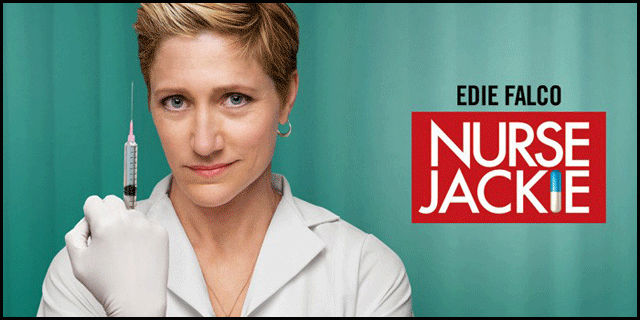
Nurse Jackie comes off only a little bit better, when you look at it straight on. Again, presented as a (dark) comedy, it’s about an emergency room nurse, a “flawed” character — who happens to use Vicodin and Adderall to get her through her life. And that’s the ongoing, static situation of the series: she’s flawed and abuses drugs – in the emergency room. Now, the series House deals with a character who overuses Vicodin. But the difference is that Dr. House has real, physical pain to deal with (due to an injury to his leg), and it is never really treated as a comedic situation. That’s a long way away from a character abusing drugs just because her life is stressful. House is well aware that his drug dependency can interfere with his ability to deal with his patients (it has figured in various stories). But what are the showrunners thinking about for Nurse Jackie?
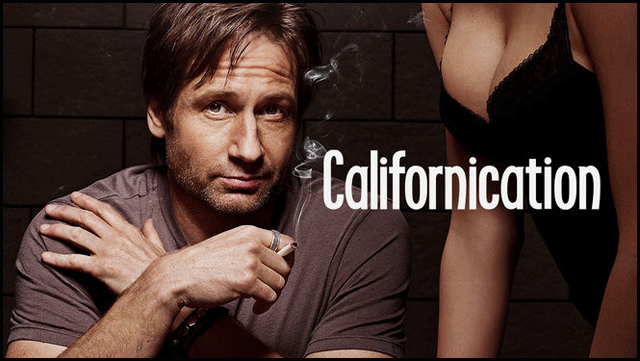
Californication has a main character who is the guy “who can’t say No.” Not to sex, alcohol or drugs, apparently. Certainly, the series deals with the consequences of this major flaw. But how can the character of Hank seem anything but weak, since he seems incapable of controlling his impulses? Why are we supposed to continue caring about this man? His judgement is bad, he easily slides into the escape of getting drunk, and he can’t remain faithful to the woman he supposedly really loves. And this too is a comedy. Why?
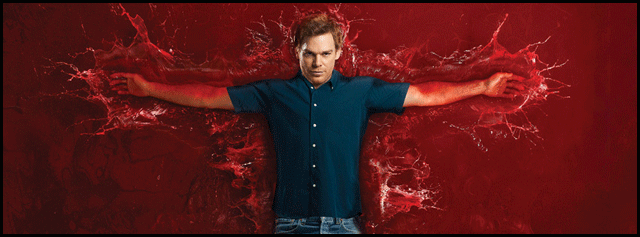
Dexter asks us to live with a psychopathic serial killer, on the excuse that he only kills those who “deserve it.” But in order to maintain his secret he constantly has to lie to the people around him, about what he does, about whether or not he really cares for them (he doesn’t, as he lacks real empathy). This is a hero? Why? What is the fascination in following this character? Why is the audience manipulated into caring about a character that would never care about them? He is not their protector, he never could be. He would do great damage to their lives if he ever came near, even if they were good people. The type of lies he has to maintain in his life cannot help but be disastrous. “But he likes children!” some might protest. Does he? If so, it is as objects, because they have not reached the age of requiring the human interaction of a peer. Should these children he “likes” become adults, he’s not going to care about them then. What kind of damage would that do to them?
Okay, I’m arguing – about Dexter in particular – as if these characters were functioning in the “real” world. But that is part of the point of entertainment. We do require a degree of emotional reality to characters in stories. But these shows are favoring the bad behavior and choices of the characters and making us agree with them. I find that to be a big problem. It makes me feel queasy.
These characters are not heroes, and they never will be. If any one of them stood up and dealt with the major problems in their lives — as a true hero would do — the premise for the show would collapse.
If the widowed mother of Weeds smartened up to how much danger she is putting herself and her family into (from the law and from the drug dealers), and got out of the business, the show would end. If Nurse Jackie got herself into counseling and drug rehab, her stories would devolve into ER or Emergency! If Hank started staying “No” to all the temptations falling into his lap, his life would straighten out and stop being interesting, at least in a TV series definition of “interesting.” As for Dexter — I’ve not heard that there is a cure for psychopathy, so it would be far more likely that the artificial restraints the series has put on Dexter’s homicidal impulses would fall away, and he would start killing innocents, he would be found out and end up either killed or in prison. Who made him judge, jury and executioner?
I’m not going to bother calling for a boycott of these shows. I don’t think that would be very effective. But I will question the bestowal of the title of “hero” on these sorry excuses for humanity. I’m sorry, but NO, they are NOT heroes.
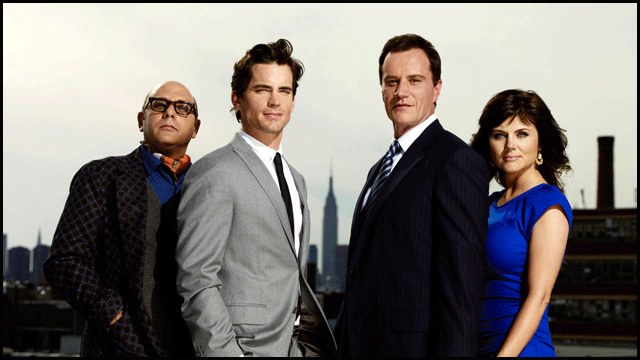
As a counter example to these shows, I recommend the original programming on USA. The characters for their shows are aimed toward genuine positive goals. They may make mistakes, they may come from dubious backgrounds (the main character on White Collar used to be an art thief and forger, after all), but they are actually characters that could be emulated in their current choices — helping others, serving justice and good.
Okay… I’ve been storing up this rant ever since I saw the first of those bus ads in San Diego. Fun? Doing wrong is “fun”? No, it is self-indulgent and self-centered. But that’s not really “fun.”
Comments
nthdraft – Aug. 4th, 2010
dear Showtime:
Heroics. Yur doin’ it wrong.
scribblerworks – Aug. 5th, 2010
Indeed! My thought exactly.
sartorias – Aug. 4th, 2010
I don’t want to waste precious life moments watching any of those shows–or even talking about them.
Sometimes I think the best defense against something that thrives on either popularity or notoriety is indifference.
scribblerworks – Aug. 5th, 2010
Oh, I agree about the indifference. And in fact, up to this point, that had been my approach.
I think in this case it was because I felt the ads were aimed specifically at the Comic Con attendees, most of whom are into “superheroes” of one sort or another – hence the tagline for the ad. It really bugged me.
kalimac – Aug. 4th, 2010
I have never heard of these shows and know nothing about them. I take it I’m not missing much.
scribblerworks – Aug. 5th, 2010
Of them all, Dexter is the one I hear the most discussion of. Apparently the production quality is good, and the lead’s acting likewise (nominated for a Golden Globe this year).
But the premise still repulses me.
margdean56 – Aug. 4th, 2010
It’s obviously because they can’t spell “protagonist”. (Mee-ow!)
scribblerworks – Aug. 5th, 2010
Hee! I can get behind that!
nthdraft – Aug. 5th, 2010
oh I’m sure they could spell it, but their intended audience either couldn’t pronounce it or probably thinks it means some kind of multi sided geometrical shape.
/snark 2: electric boogaloo
scribblerworks – Aug. 6th, 2010
Heh! Bonus snark points to you!
(Anonymous)
Aug. 6th, 2010 05:25 am (UTC)
Very Provocative, Scrib
I feel your writing keeps us interested in what you have to say Scribbler. You have an engaging way of saying things!
These shows – I have never seen them because I rarely watch TV except for occasional sports or news. Life is too busy for Showtime… I make my own showtime! And hey, I am the hero in whatever show I dream. This has been true from the “inception”. Think about that. And keep us pondering with your thought-provoking articles Scrib!!
Yours,
Jim from Bennett school
scribblerworks – Aug. 6th, 2010
Re: Very Provocative, Scrib
Thanks, Jim!
I end up thinking about these sorts of things a lot because I chose to put my career into the entertainment field. Storytelling has a lot of power, and what the storytellers ask the audience to agree to can be very important. I am disturbed when the audience is asked week after week to give such positive attention to characters that do not deserve it in any moral sense.
(Deleted comment)
scribblerworks – Aug. 31st, 2012
Thank you!
You question actually applies to a post I’m preparing for The Scribbler’s Guide to Myth blog. I think there is a parallel to be drawn, indeed.
We really need to ask ourselves what we are investing in when we say we “enjoy” a particular bit of entertainment.
Sean – Oct. 15th, 2012
Wow. Very well said, Scrib.
Sean
scribblerworks – Oct. 15th, 2012
Thanks, Sean.

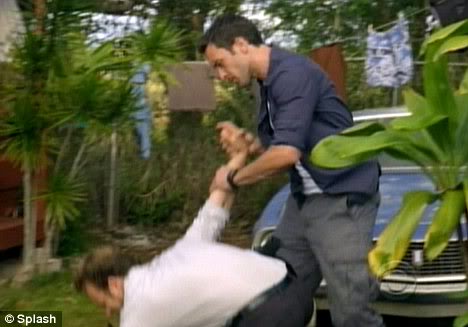 But the show has very quickly also established that outside matter of the chain-of-command, McGarrett and Danny interact as peers, as buddies. There is an equality to their personal interactions that would never be seen between siblings.
But the show has very quickly also established that outside matter of the chain-of-command, McGarrett and Danny interact as peers, as buddies. There is an equality to their personal interactions that would never be seen between siblings.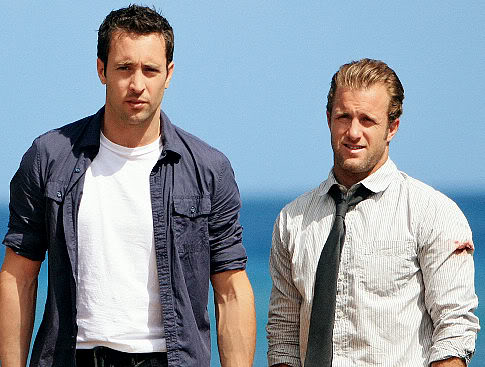 A sibling relationship, on the other hand, very rarely includes an inherent equality. I want to make it clear that there is a difference between unity in sibling relationships (“me and mine against the world”) and equality. About the only sibling relationship that might achieve equality is that of twins (and even there, one might be more a leader than the other). Siblings have a pecking order of authority, usually based on age, with eldest having the greatest freedom in how he or she treats others. Now, in storytelling, not all sibling relationships spring from actual blood or adoptive family connections. Sometimes it is just in the way two characters interact.
A sibling relationship, on the other hand, very rarely includes an inherent equality. I want to make it clear that there is a difference between unity in sibling relationships (“me and mine against the world”) and equality. About the only sibling relationship that might achieve equality is that of twins (and even there, one might be more a leader than the other). Siblings have a pecking order of authority, usually based on age, with eldest having the greatest freedom in how he or she treats others. Now, in storytelling, not all sibling relationships spring from actual blood or adoptive family connections. Sometimes it is just in the way two characters interact.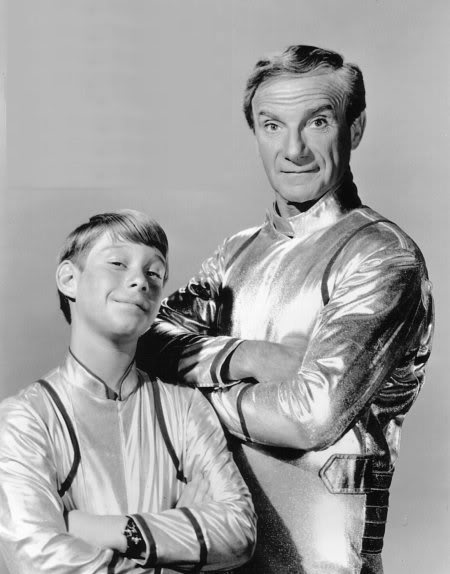 But don’t jump to the assumption that I am designating Dr. Smith as Elder Sibling in that relationship. I am not. Although Elder Siblings do have “abuse” privildeges over their youngers (and Dr. Smith was certainly abusive of the trust and freedom he was given by the Robinsons), they also have a sort of oversight of the behavior of the junior sibs. And on Lost in Space, it was Will who was doing the correcting and repairing needed because of the actions of “Younger Sib” Dr. Smith.
But don’t jump to the assumption that I am designating Dr. Smith as Elder Sibling in that relationship. I am not. Although Elder Siblings do have “abuse” privildeges over their youngers (and Dr. Smith was certainly abusive of the trust and freedom he was given by the Robinsons), they also have a sort of oversight of the behavior of the junior sibs. And on Lost in Space, it was Will who was doing the correcting and repairing needed because of the actions of “Younger Sib” Dr. Smith.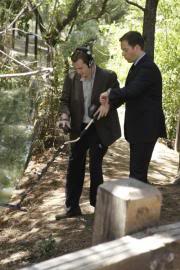 interesting way of tracking the distinction between sibling behavior and buddy behavior is the relationship of Timothy McGee and Tony DiNozzo on NCIS. In the early seasons, Tim was very much a probie in all ways, new to field investigations, new to the team, young, and very wet behind the ears. And Tony treated him always as a clueless kid brother.
interesting way of tracking the distinction between sibling behavior and buddy behavior is the relationship of Timothy McGee and Tony DiNozzo on NCIS. In the early seasons, Tim was very much a probie in all ways, new to field investigations, new to the team, young, and very wet behind the ears. And Tony treated him always as a clueless kid brother.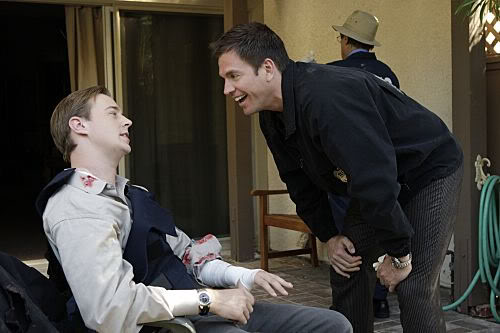 All of this discussion has been setting the stage for me to be able to say that in USA’s White Collar, the relationship between FBI Agent Peter Burke and con-man/forger/thief Neal Caffrey is not that of buddies: it is that of siblings. Against his preference, Peter gets concerned about Neal’s actions the way an older brother worries about his wayward kid brother.
All of this discussion has been setting the stage for me to be able to say that in USA’s White Collar, the relationship between FBI Agent Peter Burke and con-man/forger/thief Neal Caffrey is not that of buddies: it is that of siblings. Against his preference, Peter gets concerned about Neal’s actions the way an older brother worries about his wayward kid brother.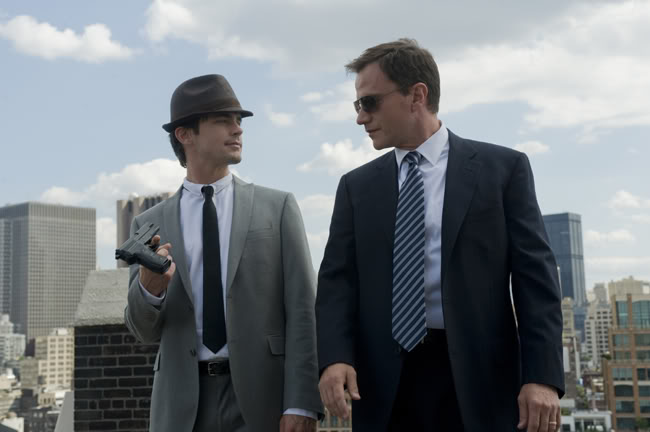 But Neal also responds to Peter with the loyalty and affection of a younger brother toward an elder he admires, respects – and fears (just a little). He respects Peter, saying he has never lied to Peter (although, con-artist that he is, he has allowed Peter to make incorrect conclusions about things without correcting him). He knows Peter has the ability to persuade him out of a course of action.
But Neal also responds to Peter with the loyalty and affection of a younger brother toward an elder he admires, respects – and fears (just a little). He respects Peter, saying he has never lied to Peter (although, con-artist that he is, he has allowed Peter to make incorrect conclusions about things without correcting him). He knows Peter has the ability to persuade him out of a course of action.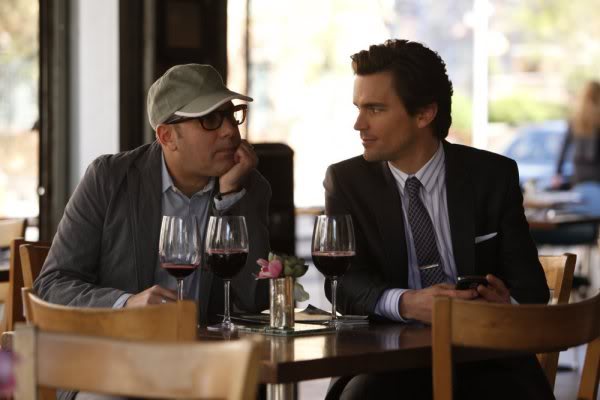 If there is a buddy on White Collar, it is Mozzie. He’s worked with Neal in the past and they interact as peers and colleagues. But as the show has progressed, Mozzie has also become something of a buddy to Peter.
If there is a buddy on White Collar, it is Mozzie. He’s worked with Neal in the past and they interact as peers and colleagues. But as the show has progressed, Mozzie has also become something of a buddy to Peter.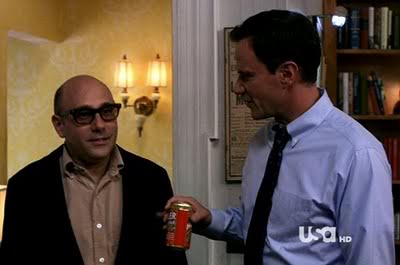 That is a relationship that Peter finds disconcerting. Mozzie does not respond to him the way Neal does. In fact, Mozzie calls him “The Suit,” something a sibling would not do going up the pecking order. Peter calls Mozzie “your little friend” to Neal (Mozzie is shorter than the other two), but he has also accepted Mozzie’s assistence in dealing with certain circumstances.
That is a relationship that Peter finds disconcerting. Mozzie does not respond to him the way Neal does. In fact, Mozzie calls him “The Suit,” something a sibling would not do going up the pecking order. Peter calls Mozzie “your little friend” to Neal (Mozzie is shorter than the other two), but he has also accepted Mozzie’s assistence in dealing with certain circumstances.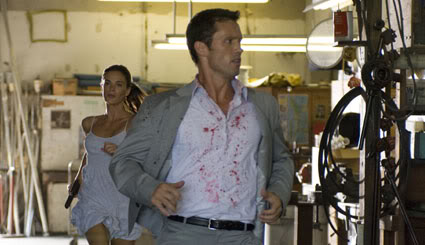 Of course, things do not always go perfectly according to plan for Michael. In the course of his actions of trying to save the client from the wrath of the Bad Guy, Michael takes a lot of punishment. And it is his willingness to absorb that punishment that is a key element in defining his character as a Savior figure.
Of course, things do not always go perfectly according to plan for Michael. In the course of his actions of trying to save the client from the wrath of the Bad Guy, Michael takes a lot of punishment. And it is his willingness to absorb that punishment that is a key element in defining his character as a Savior figure.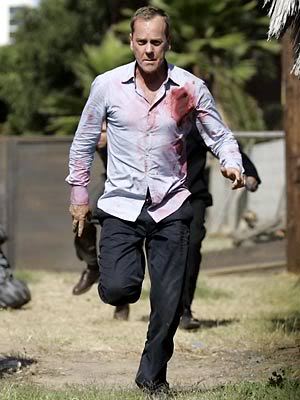 The character of Jack Bauer from 24 takes the example of a Savior figure up a notch. Jack, in the various seasons of the show, has quite literally put himself between atomic bombs, nerve gas, deadly viruses, and a wide variety of other destructive weapons on one side and Presidents, foreign dignitaries, and city populations on the other.
The character of Jack Bauer from 24 takes the example of a Savior figure up a notch. Jack, in the various seasons of the show, has quite literally put himself between atomic bombs, nerve gas, deadly viruses, and a wide variety of other destructive weapons on one side and Presidents, foreign dignitaries, and city populations on the other.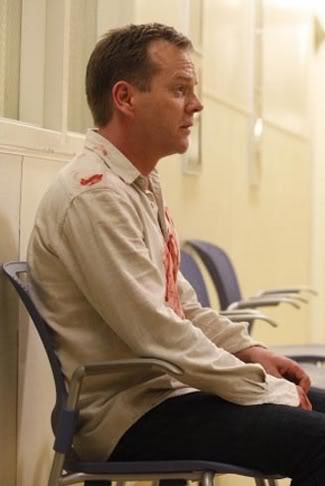 One of the interesting aspects of 24 is that although Jack may be successful in saving the Big Picture, he has sometimes failed, losing people he cared about because he was not able to save them as individuals.
One of the interesting aspects of 24 is that although Jack may be successful in saving the Big Picture, he has sometimes failed, losing people he cared about because he was not able to save them as individuals.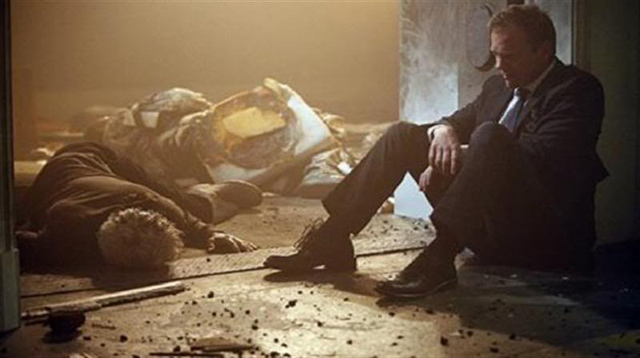
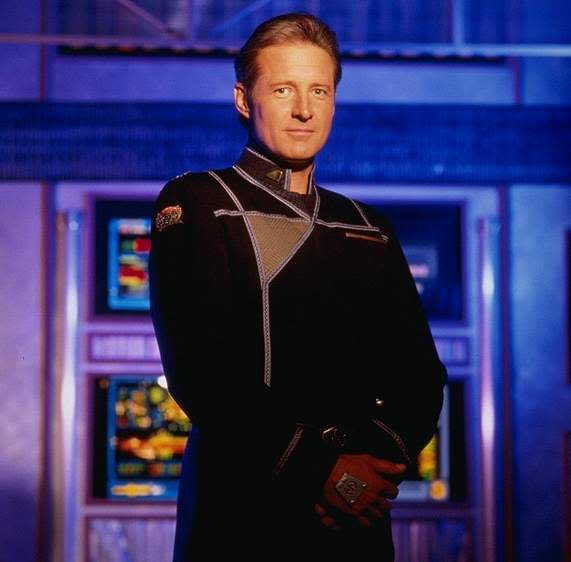 Concurrent with the building of this portrait of Sheridan, Babylon 5 also lays the groundwork for the “Shadow War.” The Shadows are presented as a great threat to the various space-faring races. As the conflict builds, it becomes clear that Sheridan is a crux between the opposing forces. It also becomes clear that if something major is not done, billions on many planets will die. So Sheridan takes it upon himself to go to the home planet of the Shadows.
Concurrent with the building of this portrait of Sheridan, Babylon 5 also lays the groundwork for the “Shadow War.” The Shadows are presented as a great threat to the various space-faring races. As the conflict builds, it becomes clear that Sheridan is a crux between the opposing forces. It also becomes clear that if something major is not done, billions on many planets will die. So Sheridan takes it upon himself to go to the home planet of the Shadows.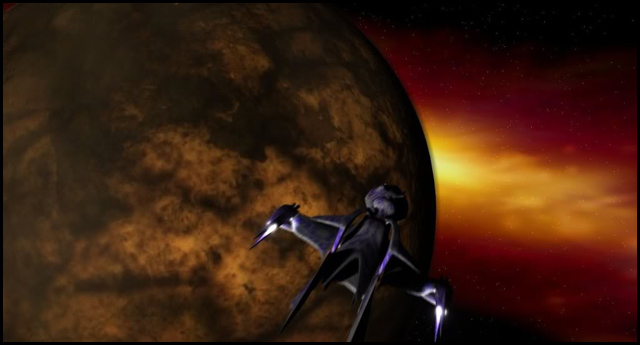 Sheridan goes to Z’hadum, the Shadow’s homeworld, with the intention of stopping them. In fact, he is so intent on stopping them to save, well, everyone, that he is willing to die to achieve it. And he does. He explodes a bomb in the center of their major city and jumps into a deep chasm, plunging to his death.
Sheridan goes to Z’hadum, the Shadow’s homeworld, with the intention of stopping them. In fact, he is so intent on stopping them to save, well, everyone, that he is willing to die to achieve it. And he does. He explodes a bomb in the center of their major city and jumps into a deep chasm, plunging to his death.



